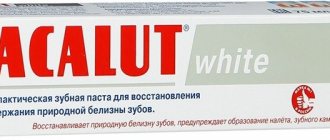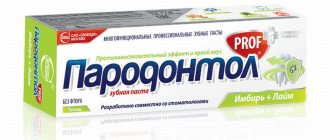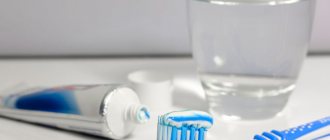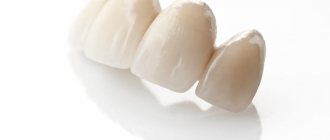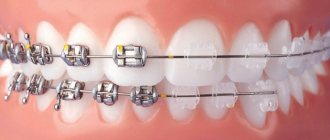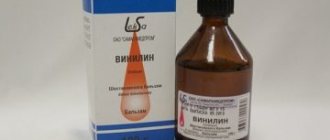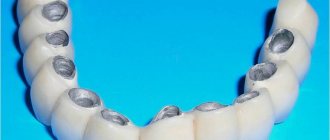From this article you will learn:
- causes of hypersensitivity of human teeth,
- best toothpaste for sensitive teeth,
- analysis of paste compositions, rating 2022.
Toothpaste can act not only as a means for cleaning teeth, but also, thanks to the inclusion of a number of active ingredients, help reduce tooth hypersensitivity, relieve inflammation in the gums, and also help strengthen tooth enamel. With increased tooth sensitivity, pain usually occurs in response to thermal and mechanical stimuli - cold, hot, when touching the teeth with a toothbrush, and sometimes even from sweets.
In most cases, this problem can be solved at home, using special toothpastes for sensitive teeth, as well as by applying gels containing one of the fluoride compounds to the necks of teeth. Pastes and gels from different manufacturers, due to their different compositions, differ in their effectiveness, and in this article we will analyze the composition of the most popular products for relieving hypersensitivity of tooth enamel.
Causes of hypersensitivity development –
First of all, this problem is associated with the thinning of the enamel layer in the area of the necks of the teeth, or with the exposure of the roots of the teeth and the thinning of the “cement” layer located on their surface.
As a result, a deeper layer of tooth tissue is exposed - dentin, which is located immediately under the enamel and cement. Dentin microscopically consists of dentinal tubes in which fluid circulates. If the dentin is not covered with enamel and cement on top, then thermal and other irritants can sharply increase the speed of fluid flow through the dentinal tubules, which ultimately leads to irritation of the nerve endings in the dental pulp and the occurrence of pain. The trigger for the development of pain (in the presence of dentin exposure) can be the consumption of acidic foods and drinks, the use of whitening toothpastes, etc.
How to choose a toothpaste for sensitive teeth -
Toothpastes for relieving tooth sensitivity (hypersthesia) have specific characteristics. Firstly, toothpaste for sensitive teeth usually has a fairly low abrasiveness within the RDA range of 25 to 35 (RDA - abrasiveness index). For example, for ordinary therapeutic and prophylactic toothpastes the RDA index is 75, and for whitening pastes it is usually 100-120.
The second important point to pay attention to is the active components. Different manufacturers use ingredients that are different from each other, which have different mechanisms for reducing tooth sensitivity, and as a result, have different effectiveness and different speed of onset of effect. Based on the mechanism of action, the following groups of components can be distinguished...
Active components in toothpastes for sensitive teeth -
- Potassium nitrate, potassium chloride - these components block the transmission of nerve impulses.
The transmission of nerve impulses is based on the exchange of potassium ions (located inside nerve cells) with sodium ions located outside the nerve. By increasing the concentration of potassium ions around the nerve endings, we disrupt this exchange, which leads to the absence of pain in the teeth - in response to thermal and mechanical stimuli. The advantage of these components is that the effect of their use develops very quickly. However, the result will last as long as you use them. Thus, potassium nitrate and chloride can quickly relieve pain, but they do not eliminate the very cause of hyperesthesia.
- Fluorides, strontium chloride, zinc citrate, hydroxyapatite - these components affect precisely the cause of the development of dental hypersensitivity - the accelerated movement of fluid in the dentinal tubules, which leads to irritation of the nerve endings.
Fluoride compounds (sodium fluoride, aminofluoride, monofluorophosphate), strontium chloride, zinc citrate, hydroxyapatite - all of them clog the dentinal tubules, preventing the movement of fluid in them. In addition, strontium chloride also promotes the deposition of replacement dentin and the compaction of its structure, which also helps reduce hypersensitivity. However, the downside of all these components is that the effect from their use develops more slowly than from the use of potassium nitrate or potassium chloride.
- Arginine and calcium carbonate combination - a combination of Arginine (an amino acid) and calcium carbonate in toothpaste - is also very effective in treating dental hypersensitivity.
Arginine facilitates the deposition of a layer of calcium carbonate on the surface of the teeth, which in turn stimulates the deposition of phosphates on the surface of exposed dentin and in the dentinal tubules, contributing to their clogging and reducing the movement of fluid in them. However, although it reduces sensitivity well, it does not solve the problem of demineralization of enamel and dentin. It should be noted here that the layer of calcium carbonate with arginine will be inactive, and calcium from this layer will not penetrate into the hard tissues of the teeth. This distinguishes arginine carbonate pastes from pastes with fluorides, after the use of which an active layer of calcium fluoride (CaF2) is created on the tooth surface. In addition to the fact that CaF2 also clogs the dentinal tubules on the surface of exposed dentin, calcium and fluoride from this layer are able to penetrate into the hard tissues of the teeth, strengthening them.
Conclusions -
Precisely because some components are capable of providing an immediate effect, while others (although their effect develops slowly, they eliminate precisely the cause of pain) - most toothpastes for sensitivity are made with a combined composition. Where potassium nitrate quickly relieves pain, and fluorides, hydroxyapatite, strontium chloride, or a combination of arginine and calcium carbonate clog exposed dentinal tubules.
However, there are also effective monocomponent products for use at home. Such products contain a very high concentration, usually of only one component, for example, potassium nitrate or sodium fluoride. In this way, they resemble professional means for reducing sensitivity that dentists use in their work. Examples of such gels are PRESIDENT Sensitive Plus and Colgate® Duraphat. How they can help you - read below.
The best toothpastes for sensitive teeth in the mid-price segment
The average price category is the best option for most buyers. Such pastes have an affordable price tag, and increased attention is paid to quality and effectiveness. The main task here is to find a product whose effectiveness and cost correspond to each other. We have collected five favorite toothpastes by customers and dentists, which have saved more than one hundred people from increased sensitivity of teeth, earning maximum positive ratings.
5 Colgate Sensitive Pro-Relief to reduce sensitivity
The Colgate brand is one of the leading brands on the Russian market.
Its products lack stars from the sky, but have firmly taken their place in the niche of inexpensive but high-quality toothpastes for any age. Sensitive Pro-Relief is created on the basis of natural components and acts as a repairman - it seals the dentinal tubules, thereby eliminating the cause of the vulnerability. Among the additional qualities, it should be noted that the paste has an excellent cleansing effect, has a pleasant refreshing taste, is gentle on the gums, for which it receives positive ratings from people in whom other formulations provoke bleeding or pain.
The only caveat that should be taken into account is that it may take time to feel improvements, although the manufacturer promises instant results. However, some users in their reviews claim that the product does not give immediate results. But the effect is long-lasting, due to the slow but sure elimination of the cause of the disease.
Sensitive Pro-Relief has passed clinical trials and is approved by the Russian Dental Association.
Pros:
- Long lasting effect.
- Restoration of tooth structure.
- Pleasant taste and smell.
- Gentle on gums.
Minuses:
- It takes time to feel the results.
- Small volume (75 ml).
Colgate Pro-Relief reviews
Colgate Sensitive Pro-Relief Toothpaste for Sensitivity Relief
4 Isme Rasyan herbal clove
Fourth place is the Thai paste ISME Rasyan, which has recently become very popular.
It is packaged in a compact jar, which makes the product even more exotic, and the original herbal taste and smell will add new sensations. It does not contain fluoride, which will appeal to people who try to avoid formulations with this component. The product has good foaming properties, is economical and has excellent cleaning properties. However, there is a small nuance - whitening comes first, so those with sensitive teeth should use it with caution when combining it with other toothpastes. The mark “for sensitive teeth” rather means that whitening is more gentle, rather than the presence of therapeutic functions.
Also, the most attentive users discovered sodium lauryl sulfate (SLS), which is responsible for foaming, but with prolonged use has a negative impact on health - it provokes the appearance of stomatitis and aphthae, which is an additional incentive to alternate pastes. ISME Rasyan is an ideal option for those who love rich foam and low consumption.
As for the effect, users are satisfied with it. ISME Rasyan whitens teeth perfectly, has an unusual but pleasant aftertaste, it can be used if the enamel is slightly sensitive, the packaging is compact, so it is convenient to take on the go. Also, the Thai novelty showed excellent results in the fight against tartar.
Pros:
- Original taste.
- Complete cleansing.
- Removing tartar.
- Compact packaging.
Minuses:
- Focus on whitening rather than eliminating sensitivity.
- SLS included.
Isme clove reviews
Isme Rasyan herbal clove toothpaste
3 Lacalut Sensitive
LACALUT Sensitive helps remove plaque, reduces the intensity of inflammatory processes due to the presence of chlorhexidine, and has an astringent effect (aluminum lactate is responsible for this quality).
But the most important thing is that a decrease in sensitivity to cold and hot, sweet and sour occurs after the first use. Thanks to the combined action of amino fluoride and sodium fluoride, a protective film is created on the surface, which quickly relieves discomfort and accelerates natural recovery. The presence of these two components also prevents the occurrence of caries. Sensitive copes well with care during the recovery period after teeth whitening. Users like the pleasant aftertaste, complex effect, gentle treatment of the gums and their strengthening due to aluminum lactate. As for the effectiveness of the paste, the opinions of buyers are divided - some praise it for its quick 100% effect, while others claim that sensitivity remains. From this we can conclude that LACALUT does not have a therapeutic effect in all cases.
LACALUT Sensitive is a therapeutic and prophylactic agent. It is recommended to use in approaches of 30-60 days, alternating each course with other lines of the brand. The paste has received approval from the Russian Dental Association.
Pros:
- Quick effect.
- Removing plaque.
- Prevent bleeding and gum inflammation.
- Safe composition.
- Prevention of caries.
Minuses:
- Not suitable for everyone.
Lacalut Sensitive reviews
Lacalut Sensitive toothpaste
2 ROCS Sensitive Instant effect
Second place – ROCS Sensitive.
This is one of the most successful developments from the WDS laboratory, effectively combating the vulnerability of the enamel layer and preserving a snow-white smile. The paste has a low level of abrasiveness (RDA=40), which allows it not to injure the already damaged shell while hydroxyapatite particles accumulate in dentinal tubules and microcracks. ROCS Sensitive “Instant Effect” works in three directions. The first is the restoration of solid structures through mineral supply. The second is sealing of defects, which leads to a rapid decrease in susceptibility. Third, activation of natural regenerative processes due to sufficient xylitol and magnesium content. The paste is suitable for any age group, including children (due to low abrasiveness), daily and long-term use.
The ROCS brand is one of the DRC group of companies, which develops and produces oral care products. DRC products are safe, combine natural ingredients and the latest developments - DRC owns not only factories, but also the WDS scientific laboratory.
Pros:
- Quick effect.
- Help with natural recovery.
- Suitable for the whole family.
- Suitable for daily and long-term use.
- Does not contain fluorides, pyrophosphates, parabens, sodium lauryl sulfate.
Toothpaste ROCS Sensitive Instant effect
1 Weleda Rataniya
Ratania is an inconspicuous dense shrub that grows in Bolivia, Peru, and Ecuador and has the valuable property of strengthening gums due to the presence of tannins in its composition.
The developers took into account the beneficial qualities of the plant, creating a natural, effective product based on it. Weleda paste with ratania is distinguished by its softness, which makes it indispensable for a double ailment - tooth sensitivity and bleeding, “loose” gums. The composition has a soothing antibacterial effect, provides thorough but gentle cleansing, and has a soft, refreshing aroma created through the use of essential oils. The product will be a real find for people who value natural cosmetics and hygiene products. The paste contains no synthetic preservatives or flavorings, harmful surfactants, or bleach.
Weleda is a company that, since 1921, has been developing and producing natural cosmetics and medicines, caring about ecology, environmental protection, and human well-being. It is not surprising that the company’s paste became the leader in the selection - its safe composition, reasonable cost, effectiveness, and lack of manipulation with customers are able to win trust.
Pros:
- Based on natural ingredients.
- Strengthens gums, relieves bleeding.
- Gentle cleansing.
- Antibacterial effect.
- Suitable for vegans.
Weleda Rataniya toothpaste
Toothbrushes for sensitive teeth –
In cases where the touch of the toothbrush bristles to the necks of the teeth causes pain and discomfort, it is recommended to use special toothbrushes with soft bristles when brushing your teeth. These brushes are marked “Soft”. They also differ from ordinary toothbrushes in that each bristle has a rounded or very thin atraumatic tip.
Price for toothbrushes for sensitive teeth –
- SENSODYNE Sensitive toothbrush – from 160 rubles,
- LACALUT Sensitive toothbrush – from 190 rubles.
Important: Use this brush only in cases where pain occurs when touching your teeth with a regular toothbrush. They cannot be used on an ongoing basis, because... Brushes with soft bristles remove microbial plaque from teeth much worse than brushes with medium hardness, and therefore, with prolonged use, plaque and tartar may accumulate on the teeth.
Sensodyne for children
Children's teeth require more attention than adults. They are very susceptible to fluoride, so this component should be absent in children's toothpaste. Sensodyne with fluoride can only be used from 12 years of age and after consultation with a doctor. However, the Sensodyne line includes products that can be used without consulting a dentist due to their absolute safety:
- Classic.
- ProNamel for Children.
- Gum Care.
Sensodyne toothpaste with unique NovaMin technology is the best oral care product. It differs from analogues in its complex effect, instantaneous effect, quality of treatment and long-term preservation of the achieved result.
